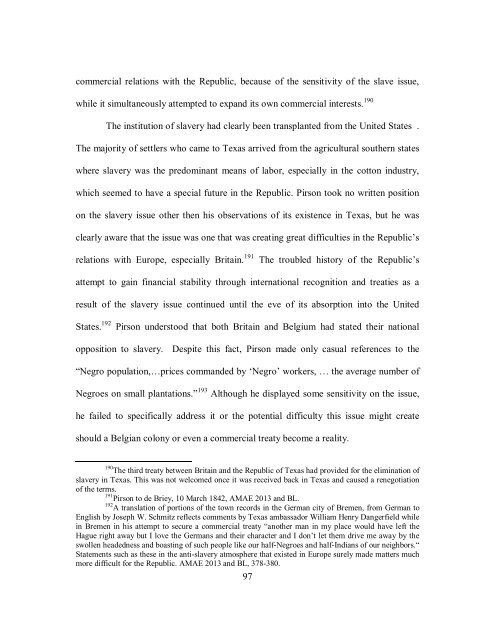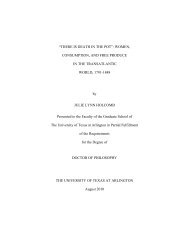EARLY BELGIAN COLONIAL EFFORTS - The University of Texas at ...
EARLY BELGIAN COLONIAL EFFORTS - The University of Texas at ...
EARLY BELGIAN COLONIAL EFFORTS - The University of Texas at ...
Create successful ePaper yourself
Turn your PDF publications into a flip-book with our unique Google optimized e-Paper software.
commercial rel<strong>at</strong>ions with the Republic, because <strong>of</strong> the sensitivity <strong>of</strong> the slave issue,<br />
while it simultaneously <strong>at</strong>tempted to expand its own commercial interests. 190<br />
<strong>The</strong> institution <strong>of</strong> slavery had clearly been transplanted from the United St<strong>at</strong>es .<br />
<strong>The</strong> majority <strong>of</strong> settlers who came to <strong>Texas</strong> arrived from the agricultural southern st<strong>at</strong>es<br />
where slavery was the predominant means <strong>of</strong> labor, especially in the cotton industry,<br />
which seemed to have a special future in the Republic. Pirson took no written position<br />
on the slavery issue other then his observ<strong>at</strong>ions <strong>of</strong> its existence in <strong>Texas</strong>, but he was<br />
clearly aware th<strong>at</strong> the issue was one th<strong>at</strong> was cre<strong>at</strong>ing gre<strong>at</strong> difficulties in the Republic’s<br />
rel<strong>at</strong>ions with Europe, especially Britain. 191 <strong>The</strong> troubled history <strong>of</strong> the Republic’s<br />
<strong>at</strong>tempt to gain financial stability through intern<strong>at</strong>ional recognition and tre<strong>at</strong>ies as a<br />
result <strong>of</strong> the slavery issue continued until the eve <strong>of</strong> its absorption into the United<br />
St<strong>at</strong>es. 192 Pirson understood th<strong>at</strong> both Britain and Belgium had st<strong>at</strong>ed their n<strong>at</strong>ional<br />
opposition to slavery. Despite this fact, Pirson made only casual references to the<br />
“Negro popul<strong>at</strong>ion,…prices commanded by ‘Negro’ workers, … the average number <strong>of</strong><br />
Negroes on small plant<strong>at</strong>ions.” 193 Although he displayed some sensitivity on the issue,<br />
he failed to specifically address it or the potential difficulty this issue might cre<strong>at</strong>e<br />
should a Belgian colony or even a commercial tre<strong>at</strong>y become a reality.<br />
190<br />
<strong>The</strong> third tre<strong>at</strong>y between Britain and the Republic <strong>of</strong> <strong>Texas</strong> had provided for the elimin<strong>at</strong>ion <strong>of</strong><br />
slavery in <strong>Texas</strong>. This was not welcomed once it was received back in <strong>Texas</strong> and caused a renegoti<strong>at</strong>ion<br />
<strong>of</strong> the terms.<br />
191<br />
Pirson to de Briey, 10 March 1842, AMAE 2013 and BL.<br />
192<br />
A transl<strong>at</strong>ion <strong>of</strong> portions <strong>of</strong> the town records in the German city <strong>of</strong> Bremen, from German to<br />
English by Joseph W. Schmitz reflects comments by <strong>Texas</strong> ambassador William Henry Dangerfield while<br />
in Bremen in his <strong>at</strong>tempt to secure a commercial tre<strong>at</strong>y “another man in my place would have left the<br />
Hague right away but I love the Germans and their character and I don’t let them drive me away by the<br />
swollen headedness and boasting <strong>of</strong> such people like our half-Negroes and half-Indians <strong>of</strong> our neighbors.“<br />
St<strong>at</strong>ements such as these in the anti-slavery <strong>at</strong>mosphere th<strong>at</strong> existed in Europe surely made m<strong>at</strong>ters much<br />
more difficult for the Republic. AMAE 2013 and BL, 378-380.<br />
97
















